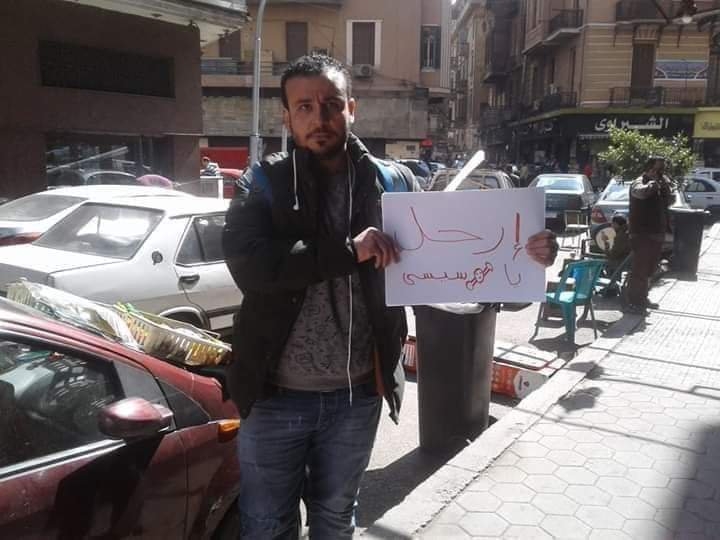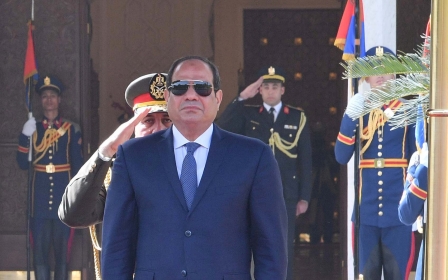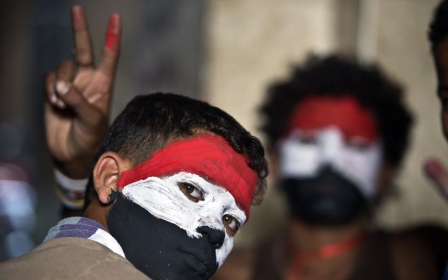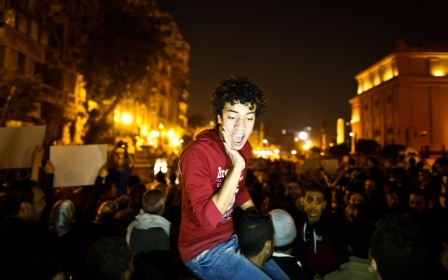Uproar as solitary Egyptian protester arrested in Tahrir Square

A one-man protest in Cairo's iconic Tahrir Square against President Abdel Fattah el-Sisi has gone viral after the protester was arrested by Egyptian authorities.
On Thursday, Ahmed Mohy stood in the Egyptian capital's famous square, which was the epicentre of Egypt's 2011 uprising, holding a small, handwritten sign reading: "Step down Sisi".
An unidentified man took photographs of Mohy, which quickly gained attention on social media.
However, the two were soon picked up by the police.
Mohy posted a video of himself in the back of the police car describing what had happened to him and asking for support.
New MEE newsletter: Jerusalem Dispatch
Sign up to get the latest insights and analysis on Israel-Palestine, alongside Turkey Unpacked and other MEE newsletters
The charges against Mohy are not yet clear, and it is not known what has happened to him and the photographer.
"I am in the police car, and they are trying to take my phone. They arrested another guy with me. I was alone, this guy was not with me; he was just using a camera to get a photo, and there is no crime," Mohy is seen saying in the video.
"It is a crime in Egypt, despite it being against human rights, for two or more people to congregate. This is a crime or problem in Egyptian law."
Screams and pleas for help from the person who took the photo can be heard in the background of the video, begging to be let out in order to take his mother to her heart surgery the following day.
"We are going to the police station. I didn’t do anything, just raised a signal … I am asking the world, save our soul," Mohy said.
"We are going somewhere and don't know what will happen to us, maybe they will inject us, maybe they will kill us, maybe they will burn us or bury us or do anything … "
"Now I am appealing to all the human beings all over the world, I am facing an unknown destiny … the simplest right of a human being to express what he's feeling is now kidnapped from us," he added.
In his video, Mohy references the train crash in Cairo's main station that killed at least 22 people on Wednesday. The protester implicitly blames Sisi, who he says put interest rates over transforming transport systems in Egypt.
Sisi, Mohy said, preferred accruing interest from banked public funds "instead of fixing the train stations and instead of fixing life in Egypt".
Last year, during a presentation for a highly publicised national transport plan, Sisi quizzed transport minister Hesham Arafat over the benefits of upgrading the country's railway system.
"You tell me, 'I will spend $10bn [$570m] to digitise and mechanise [trains].' Those 10 billion, if I put them in the bank and get 10 percent interest, that's 1 billion [Egyptian] pounds. And under the new interests rates, that's 2bn pounds," Sisi said.
At the presentation, Sisi went on to berate citizens who complained about the price of public transportation.
"When you tell him [the citizen], 'I'm going to raise the price of the ticket by 1 pound,' he says: 'I'm poor, I can't'. True. I too am poor, and I can't [upgrade the transport system]."
Attracting attention
Mohy's protest and subsequent arrest have garnered much attention on social media.
In a tweet, prominent Egyptian lawyer Gamal Eid noted Mohy was detained within minutes of beginning his protest, despite not committing any crimes.
Translation: This man stood alone in Tahrir Square holding up a paper that read ‘Step down Sisi’. Within minutes he was arrested and disappeared. He did not commit any crimes, what he did was in the field of freedom of expression. The law of protest, despite its injustice, says 10 or more people constitutes a protest. This person is a prisoner of conscience
The images of Mohy holding up his sign have been shared widely.
Mohy's sister, Asma Mohy, also took to social media to say that her brother is not a radical and was simply frustrated by the train accident the day before.
Since the train crash at Ramses train station the hashtag #WeAreReturningToTahrir has been trending on social media.
Sisi, who took power in a 2013 military coup, could hold power until 2031 as constitutional amendments are in the process of being passed that award him two new six-year terms.
Rights groups say some 60,000 political prisoners have been arrested or imprisoned since 2014.
Middle East Eye delivers independent and unrivalled coverage and analysis of the Middle East, North Africa and beyond. To learn more about republishing this content and the associated fees, please fill out this form. More about MEE can be found here.




